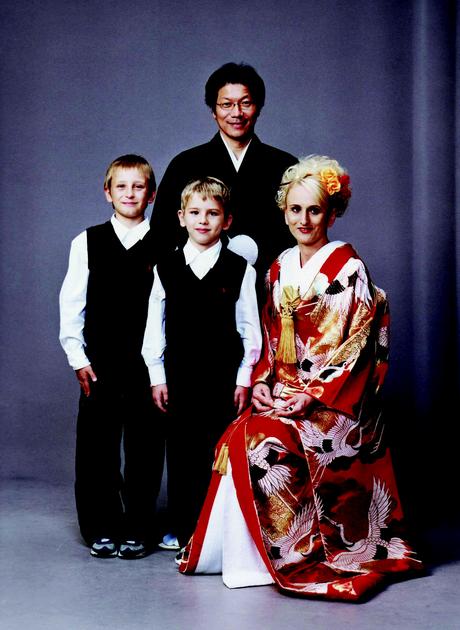
Michaela Schonhöft did an interview with me and published it on her blog. Since it is written in German I will publish the approx. translation here and even added here and there because the plain translation is difficult to understand the German mind. Mainly I speak about my own experience and not about whole Japan because every family is different.
http://www.michaela-schonhoeft.de/blogs-to-go/blogs-interkontinental/
THE SUN OF THE FAMILY IS THE WIFE IN JAPAN
Martine Müller talks about her warm Japanese in laws and her new home New Zealand.
Martine Müller (a pseudonym inspire by her grandmother`s maiden name) knows the diversity of Asia. The German lived with her Japanese husband and her two sons in Singapore, Tokyo, Dubai and since last summer in Christchurch, New Zealand. She enjoys her intercultural marriage and loves the amusing misunderstanding which are sometimes occurring. Japanese fathers are softies, that is what Martine Müller says. Parents in Japan are generally indulgent. Along the lines to critic one time and praise ten times. She learned to appreciate that. One point Japanese parent do not compromise is the wastage of food.
Martine, what is your experience as mother in Japan?
Education is important for me and it was often the point of discussion when gathering with my Japanese friends. Our kids went to the Japanese school and when we had problems they try to help with advice. For example Soloban (maths tuition with a slide rule). At that time I taught my kids different subject from 5am to 7am, also German.
I am a health freak, especially food. Learning Japanese was the biggest problem for me. At the beginning I was not able to read salt. Well, I know the word but I could not read it. In the weeks after my arrival in Japan I tried to buy all ingredients for a Japanese dish without any help. I will never forget that I started crying in the middle of this grocery shop because everything was written in Romanji. It does not helped me a bit, every label was written in Kanji, Hiragana and Katakana.
After the 2011 earthquake the danger of contaminated food was present. It was my time to learn all Kanji. A nightmare! Many mother didn`t see this as a problem, they ordered online and 90% of the mothers at the German school were Japanese, so they didn`t have a problem at all.

In 2010 we moved back to Tokyo from Dubai. This time the kids visit the German School Tokyo Yokohama. For me this time was very isolated. Families lived throughout the metropolitan area of Tokyo / Yokohama. It was difficult to maintain a relationship or find some friends.
A big support was my Japanese family. My in laws taking good care of us. I feel very comfortable. I am not sure if this is usual but if I compare this to my former mother in law from Germany I am in heaven.
Japanese families are very conservative. At the same time many well educated women rush into the work force in Tokyo. What do you observe in Japan, especially in Tokyo, how this new family model is compatible with family and job and how does it changes the role allocation within the family?
Women always worked in Japan. From my point of view this is nothing new. However compared to Germany, women work until they get married in Japan and that is the difference. It seems still the case. Though increasingly women choose not to get married.
In the past 20 years something changed. Women have the choice. Companies are interested to get female employees since the birth rate is declining. Women are a natural source of the work force. In the old days you showed a woman a picture of her possible future husband. She had not many choices. Today she has the internet and many alternatives and time.
In Japan it is very important that kids get a good education. I have not observed that boys are favored. Money is the key for success. Certain private school work directly with specific Universities together. And those, again, are more or less working with important companies together. For example the Tokyo University is know that a lot of their graduates will be future civil servants. If you wish to go to this University you need to go to a good school and visit tuition in the afternoon. This is expensive.
Today less children are born. Families are smaller and this might be another reason why more well educated women are in the work force. Early parents plan the education of their kids, sometimes years before the first child is born. Women are not restrained, it is more the opposite. They are the silent ruler within the family. They divide the money, bring up the kids and plan their future. Many, not all, are proud to be homemaker and mother. Successful kids means a successful mother.
The roles are clear defined, if the father works and the mother stays at home. If both parents are working and I personally know only one example within my family, than the grandparents help a lot. They will take over the housework and the upbringing of the kids. In Tokyo more and more grandparents are not living with their kids, they have their own apartment or house. Still they care for their grandchildren on a daily base. Usually mother are well supported. Again, I only know one family.
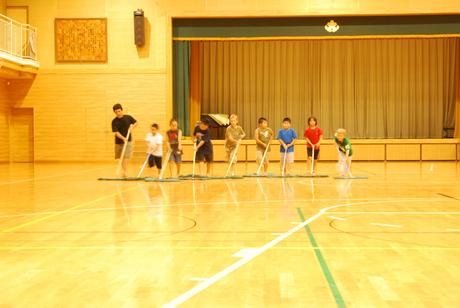
http://martinemueller.blogspot.de/
Your husband is Japanese and you are from Germany. Do you have different ideas in bringing up your kids? Do you have to compromise? What is important for you and what is important for him?
My husband told me once: “The wife is the sun of the family and if she is not happy the family is not happy.” This sounds very cheesy but it hit the nail on the head.
Yes, especially at the beginning we had different ideas of nurturing. My husband does not criticize and punish. I learned a lot from him. Although we have same or similar values, e.g. wastage of food. Japanese fathers are softies.
On the one hand I am typically German and expect good manners at the table on the other hand I do not have a problem if the kids want to sleep in our bed every night. They have their own rooms but I believe that kids will ask if they need something at that particular moment, e.g. being close. I criticize seldom because my oldest son stammers and I learned in a therapy that I should praise 10 times before voice my critic once. I stick to it although I was raised different.
I have one story to tell: We visited a famous American restaurant in Yokohama. My oldest son, then 8 years old wanted to order a huge portion of spare ribs. Of course it was to much. My husband with his pokerface started a conversation with him:
Hubby: Do you think you can finish that?
My son: Yes!
Hubby: I think you should order a half portion.
My son: No!
Hubby: Well, if you order this portion you have to finish it.
My son: Yes!
Hubby: I think you should order a half portion because I believe you cannot finish it.
My son: I can finish that. I want the whole portion!
Hubby: Well, let’s order the whole portion then.
Well, my son could not eat all but my husband insisted that he stand to his promise and finishes all. I left earlier with my little son because it took some time. I think they arrived an hour later at home. My oldest crying!
My son: Mama, you wouldn’t believe it, I had to eat all, I will burst …
Since then we never had a problem again when ordering the right size of portion in a restaurant, at home or elsewhere.
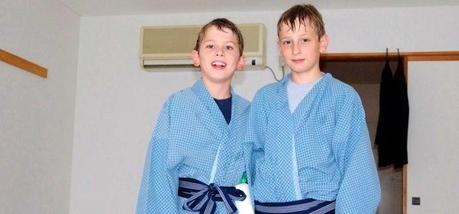
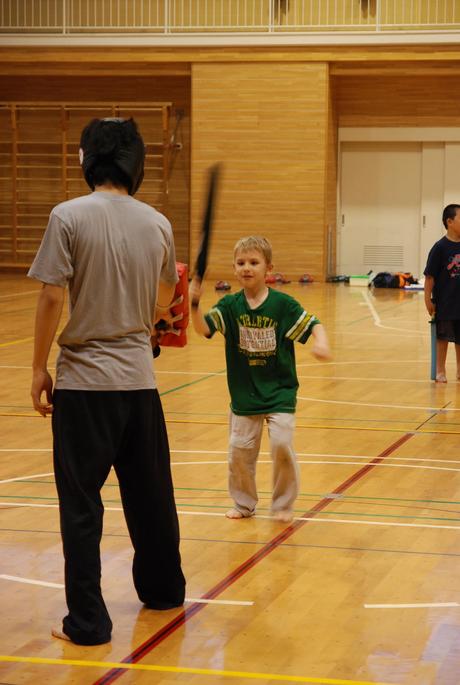
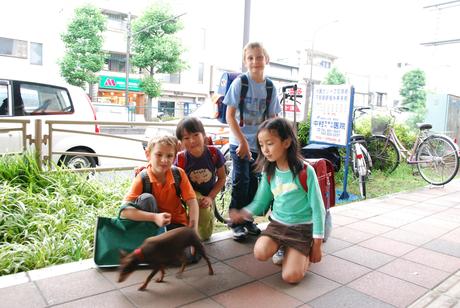
I want my kids happy and I want to achieve it and incorporate in their upbringing. I do not have problems with them as teenager. We do a lot of things together. I try to be consequent and if they have wishes I try to fulfill them. I always say yes, if they wan to sleep in our bed, I seldom ask why. There are things they do not want to talk about or don’t know how to express their feelings and I leave it. Usually this phase if over within one or two days.
My main task in the past years was to built them up after school because of the critical environment in German Schools. It came to the point that they would not talk English at home because they said that the teacher said they are not good at all. I explained to them that that is bullying and even they should show respect to adults this is a different kind of adult. I try to be interested in their hobbies. Though my little one doesn’t know what are his interests and we are searching together. My older son is doing is glider license and after 11 flights he flow solo for the first time. He knows what he wants and following his dreams.

http://martinemueller.blogspot.de/
How close are family relationship in Japan? Do you have the impression that being loyal to your family is more important than in Germany? How does it works in a big city like Tokyo?
Families are very close and there is a warm relationship between all. Continuously everybody is curious about the others and the kids are so welcomed and showered with attention whenever we visit. I cannot believe that., it is so different in my family. A sanctuary for all who belongs to it.
Almost the whole family of my husband is living in Niigata. His mother calls every week at least once. Every big or bigger event is celebrated together and we are meeting regular in Niigata. We get extra rice, not that we are starving. I am pampered and I do not exaggerate.
I think I got one of my biggest surprises in February/March 2010 when we received the message that we will move back to Japan from Dubai within two months. My husband looked for a house close to the German School. He gave me 6 choices and I selected 3. Assuming that I will look at them at one point in time and select THE ONE. Since we did not talk about it I received a big surprise a week later. My parents in law looked at all three of them and suggest one house. I was stunned! The Japanese way! It was not a question that I would not accept their suggestion. Well, I loved the house and at the end I was thankful that they took the time to look at it. They are old, it was a big effort for them.
You lived in different countries. Where do you think is the best life for families? Which country do you think is extremely child friendly?
Singapore!
You describe in your blog what kind of problems can occur when you look for a job abroad. What are you tips for women to be successful in their careers?
I can speak only for Singapore, since I do not have any experience in Japan and even less in whole Asia. Education, starting with a Bachelor Degree and it is important to find a job while you are in Germany. Good networking once in the country and maintaining those contacts. Be positive when you communicate. The German strait communication is not appreciate. People see it as emotional and in stabile. Be persistence in your job and on top of your game. You will find everywhere backstabber, also in Asia. There is no social net to catch you once you are out of job.
How are your kids in Japan? What kind of impression do you have from the school system in Tokyo?
When they went to he Japanese school they were very happy. This changed with the German school, especially for my younger son. From the start he had adjustment difficulties. We had very bad experience with the German School and had the experience that power was mishandled and misused. Teacher played god and try to destroy my son`s future. Kids with fathers from German companies were treated better than my son with a father who works for a Japanese company. We cannot beat the system and therefore we decided to go to New Zealand. I want my kids to have positive experiences and a positive life attitude and open their mouth if something is not right. I don`t want them to be silent and just watch if something unreal is happening. Not one parent at the school try to interfere with decision made by the teachers, although many of them could not believe decisisions made, they all watched and even celebrate the Octoberfest. It was unreal.
Well, we achieved it. My elder one is happy because he can finally follow his dream to be a pilot. My little one is still searching … it need time but kids forget fast! He didn`t want to have friends in the beginning but we are almost 5 months here and I think he forgot about it. He started trusting people again and his English is fine, he told me the other day, Mama, you were right!
What do you think makes kids happy?
A happy mother / father and family!
